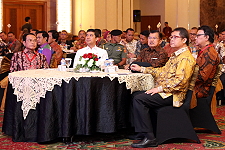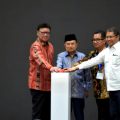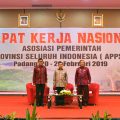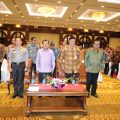Jakarta-wapresri.go.id. Regional autonomy is a must to respond the change in the Indonesian political system from centralization to decentralization.
“Regional autonomy is aimed at giving regions the chance to develop and to innovate in a bid to advance the regions,” said Vice President Jusuf Kalla in his remarks delivered in the opening ceremony of a national seminar with the theme “Strategies and Policy Direction for the Development of Smart Cities to Face Challenges within ASEAN Economic Community (AEC)” and the launching ceremony of the Regional Autonomy Institute (i-Otda) held at Grand Sahid Jaya Hotel, Jakarta, on Tuesday (April, 26).
He then underscored that the objective of regional autonomy is to improve people’s welfare. This ultimate goal, he said, could be attained among others by improving public services, supporting democracy, developing social justice, and realizing equality among regions.
“In the previous centralized era, central government had the authority to regulate almost all aspects in life. After the reform era, we cannot make such uniformity. Now, all regions get the same opportunity to develop,” said the Vice President, adding that the success of an autonomous region is highly determined by the capability of its regional leader.
Regions, he continued, are now allowed to manage their own general allocation fund (DAU) and special allocation fund (DAK). However, with such flexibility, Mr. Kalla said, central government still holds the authority to preserve national stability and equality by issuing certain related policies whenever necessary.
In regards with AEC, the Vice President considered it as a big opportunity, instead of a challenge. This, to him, is similar to technology, which is an inherent part of modern life. In such a condition, he said, the idea of Smart City became paramount.
According to the Vice President, Smart City combines the country’s governmental system with technology to support bureaucracy management in various ways.
“In principle, there should be a link in Smart City between assets, programs, and the people,” he said.
He then expected Home Ministry would adopt the concept into national program to achieve better public services, higher efficiency, and transparency.
“The concept supports regional autonomy in improving people’s welfare and strengthening the nation,” he said.
Previously at the same event, President of the Regional Autonomy Institute (i-Otda) Djohermansyah Djohan stated that the essence of regional autonomy is shared tasks and responsibility between central and regional government.
“(This is aimed at) realizing easier, more efficient and effective administration to manage development, provide better public services, and foster democracy,” he said.
Concluding the ceremony, the Vice President accompanied by Home Minister Tjahjo Kumolo, Communication and Informatics Minister Rudiantara, Adminsitrative and Bureaucratic Reform Minister Yuddy Chrisnandi, and i-Otda President Djohermansyah Djohan touched a screen display to officially launch the Regional Autonomy Institute (i-Otda) and to formally open the national seminar.







